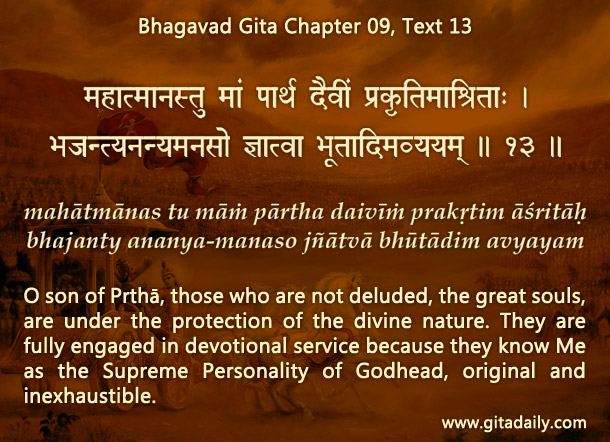Erudite Gita commentators throughout history have unpacked its wisdom-filled verses in multiple ways. By examining the context, tone, word usage and similar details, they reveal the many levels and layers of meanings in its verses.
Yet all such reading between the lines follows a cardinal principle: the deeper meanings supplement or complement or contextualize the text’s direct meaning – never reject it. Rejection of the direct reading comprises violence to the text, for the interpreter’s voice silences and supersedes the author’s voice.
Rejection of the direct reading comprises violence to the text, for the interpreter’s voice silences and supersedes the author’s voice.
Such unscrupulous usurping of authorial authority is evident in the commentary of an (in)famous modern commentator to the Gita verse (09.34). In the whole Gita, this verse is one of the clearest calls for committed devotion to a Personal Absolute Truth. It uses the first person pronoun mam and its variants six times, thereby leaving no ambiguity about the object of devotion.
Yet this commentator claims that the intended object is not Krishna, but some unborn Absolute within him.
Does the context justify such a depersonalized reading?
Not at all. The text is preceded and succeeded by sections that emphasize the ultimacy of the Personal Absolute Truth (09.24; 10.08). Moreover, the verse’s call is reiterated in the conclusion of the Gita (18.65), which uses again six first person pronouns and seventy percent identical words.
When the text features self-evident lucidity that is confirmed by its context, an indirect reading that contradicts the direct reading comprises not reading between the lines, but replacing the lines. This kind of reading is a product of the interpreter’s brain, not the author’s brain. It won’t connect us better with the author; instead, it will impede a budding connection or even impair an existing connection.
To go close to the Gita, it’s best to keep such commentaries far away.
Explanation of article:
https://www.youtube.com/watch?v=iUk2wK7DBCk


Hare Krishna dear prabhuji,
PAMHO. AGTSP. As You have stated already, while the beauty of Gita is that it is capable of infinite spiritual insights just like the Supreme Lord is infinite and every verse is pregnant with meaning, You have very beautifully articulated the principles that any authentic commentary should follow in this article, i.e
1 the deeper meanings complement or supplement or contextualize the direct meaning of the text – never reject it
2 Rejection of direct meaning constitutes violence to the text
Ys
subash